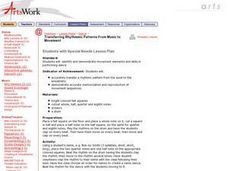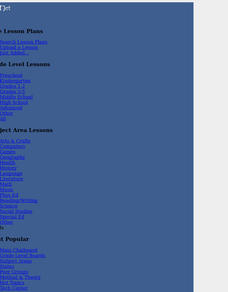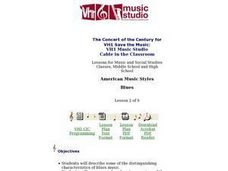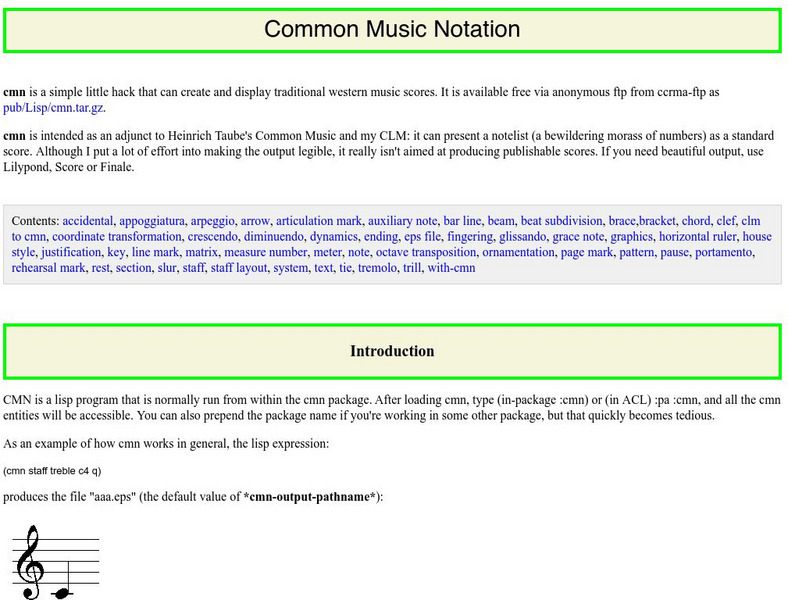Curated OER
Syncopated Duet
Students work in pairs to compose a duet (with percussion instruments) that contains syncopated rhythm sequences. Each student will research a piece of music that they feel uses syncopation and will give a persuasive speech to the class.
Curated OER
Treble Clef Quiz Part I: The Basics
This three-part quiz tests learners knowledge of the treble clef by asking them to name the parts of the treble clef, to write the letter names under the notes represented, and to write the note names on the correct line or space.
Curated OER
Outline: Notes of the Treble Clef Staff
Score one for test prep. Young musicians are encouraged to create their own mnemonic devices to prepare themselves for a test on the treble clef staff. Using the provided worksheet, individuals record, in order, the names of the lines...
Curated OER
Bass Clef Note Names Test
Asses your musicians' knowledge of clef note names with a two-page test that asks them to identify the names represented by the nomenclature and then to place a whole note on the line or space that is appropriate for the letter name.
VH1
Lesson 4: Behind the Movie Chicago
The elements of music and journalistic integrity in one lesson; What could be better? The class discusses journalistic approaches to better understand responsible reporting versus sensationalism. They watch the Act One from the film...
Curated OER
Putting Pitch In Its Place
Students focus on reading musical notations. They see, hear, practice and write notations in the lessons to become more independent readers of music. They complete a Rubric for Pitch Worksheet.
Curated OER
Basketball Notes
Students add the value of various musical notes to win a chance to shoot a basketball. They compete in teams and consider the values of quarter, half and whole notes to complete related math problems.
Curated OER
Using Harmonic Vision’s Music Ace Software to Reinforce Basic Music Skills
If you have access to Harmonic Vision’s Music Ace Software, then this instructional activity could work for you. Kindergarteners use the video music software to place, identify, and read musical notes. They listen in and identify both...
Curated OER
Transferring Rhythmic Patterns From Music to Movement
Students identify and demonstrate movement elements in relation to musical notation. They clap to rhythms, beat on drums, match musical notes to speech patterns and use the rhythms of the their names to create a dance.
Curated OER
Jazz and Math: Rhythmic Innovations
Students watch a segment of the PBS Ken Burns JAZZ documentary about Buddy Bolden creating the "Big Four." They compare and contrast the rhythms of marches and jazz based on the examples in the film, and explore notation, subdivision of...
Curated OER
Lesson Exchange: Musical Mathematics (other, Music)
Students explain note values and relationships, especially dotted rhythms and tied notes by giving them a visual, hands on representation
Curated OER
Music and Math
Young students are exposed to four types of musical notes - whole, quarter, half, and eighth. They practice clapping along with the notes on each slide. A little bit of math is mixed in with the music, in that each slide shows a pie that...
Curated OER
American Music Styles: Blues - Lesson 2
Students describe some of the distinguishing characteristics of blues music. They compare and analyze two versions of the same 12-bar blues song. They read and identify notation symbols for rhythm and tempo.
Curated OER
How Do I Measure Up? (Intermediate)
Fifth graders compare the relationship between meter in music and measurement in math. They practice sightreading music by determining the number of beats per measure, clapping and counting the rhythm.
Curated OER
Vitamin A
Learners identify and pat the beat. They move to and play quarter notes, half notes, and eighth notes to create a "factory" movement and instrument improvisation. Students get into groups of three. Each person in the group moves to one...
Curated OER
Reading Music Notation
Ninth graders develop an understanding of music notation and become proficient at reading rhythms by sight. They explore rhythms base on divisions of two and four and triplets.
Curated OER
Valentine Heart Game
First graders clap a rhythm pattern notated on a board, and then make up their own patterns on percussion instruments. They answer addition and subtraction problems.
Stanford University
Ccrma: Common Music Notation
This resource features information on notes, rests and many, many other basic music theory examples.
Music Theory
Music theory.net: Note Trainer
A fabulous tool for music teachers and students! This online quiz tests students knowledge of the various musical notes. (Click on "toggle" to check your answers along the way.)
Quia
Quia: Rhythm
Pick one of these interactive activities to strengthen your knowledge of rhythm and musical notes. Play matching, concentration, flashcards, or a word search to review these musical terms.
Music Theory
Music theory.net: Note Duration
A fabulous resource for beginners in music theory! Gives examples and explanations of the sixteenth note, eighth note, quarter note, half note, and whole note. The last page on this site provides a chart showing the relationship of each...
Music Theory
Music thoery.net: Measures and Time Signatures
A fabulous resource for beginners! Gives examples and explanations of measures and time signatures. Simple illustrations and explanations make this animated site easy to follow.
Music Theory
Music theory.net: Dots and Ties
A terrific resource for beginners! Gives examples of dots and ties, and explains how they are used. Simple illustrations and explanations make this animated site easy to follow. By MusicTheory.net.
Music Theory
Music theory.net: Simple and Compound Meter
Examples of simple and compound meters, as well as explanations of the terms duple, triple, and quadruple. Plenty of illustrations accompany this terrific resource. By MusicTheory.net.

























